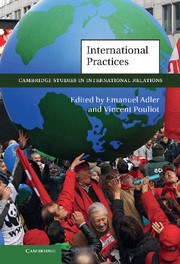Book contents
- Frontmatter
- Contents
- Figure
- Note on the contributors
- Acronyms and abbreviations
- Part I Practices in International Relations and social theory
- Part II Practices and their background
- Part III The evolution of practices
- Part IV Practices in practice
- 9 Banking on power
- 10 The practice of political manipulation
- 11 Performing practices
- 12 Privatization in practice
- Part V Conclusion
- Index
- References
11 - Performing practices
a poststructuralist analysis of the Muhammad cartoon crisis
from Part IV - Practices in practice
Published online by Cambridge University Press: 05 June 2012
- Frontmatter
- Contents
- Figure
- Note on the contributors
- Acronyms and abbreviations
- Part I Practices in International Relations and social theory
- Part II Practices and their background
- Part III The evolution of practices
- Part IV Practices in practice
- 9 Banking on power
- 10 The practice of political manipulation
- 11 Performing practices
- 12 Privatization in practice
- Part V Conclusion
- Index
- References
Summary
This chapter takes the practice framework laid out in Chapter 1 as the starting point for a more in-depth discussion of what a poststructuralist-practice approach might entail and what it could accomplish. In doing so, it suggests a reading of practice through Michel Foucault who is frequently alluded to in works on practice, but who has not yet been systematically explored. Drawing on Foucault as well as poststructuralism more broadly, I start from the view laid out in Chapter 1 that practices are repeated in a manner that makes them “reminiscent of routine.” Yet, while the view of international practices as routine performances surely casts important light on phenomena and dynamics that have often been overlooked – or not properly understood – by the discipline of International Relations (IR), I suggest that practices might also not be routine, more precisely that there are instances when specific practices are sought to be performed as if they are routine, when in fact they take place on a terrain that is much more contested and unstable. Our understanding of “routine,” a key concept in practice theory as evidenced by Chapter 1, would in short benefit from a poststructuralist emphasis on the inherent instability of discursive practices.
As Chapter 1 also makes clear, poststructuralism and Pierre Bourdieu-inspired approaches have a lot in common: they were the first to introduce the concept of practice to IR and both have pointed to the significance of everyday practices and the need for understanding them as linguistic as well as material. Yet, there are also ways in which the two approaches differ, one of which is how the role of inarticulate, routine background knowledge should be theorized. The Bourdieu-inspired theory developed by Vincent Pouliot, for instance, defines practices as “the result of inarticulate, practical knowledge that makes what is to be done appear ‘self-evident’ or commonsensical,” while the poststructuralist approach I lay out in this chapter takes practices to be ambiguously situated between the sedimented and self-evident, on the one hand, and the contested and unstable, on the other. Specifically, I suggest that as “practitioners practice,” they perform specific practices that are asserted as though they belong to a general – perhaps “self-evident” – practice. Even uncontested specific “routine” practices are crucial to the reproduction of general practices, and we should therefore keep the relationship between specific and general practices open and examine the (potential) gap between them. Methodologically, this allows us to build a research design around prominent specific practices, asking which general practices they mobilize and whether a specific practice’s claim to a general category of practices is stable or not. Finally, drawing on Foucault, I emphasize how discursive practices constitute a domain with a particular politico-epistemic quality – as, for example, legalistic, political, artistic, religious, ideological, or ethical.
- Type
- Chapter
- Information
- International Practices , pp. 280 - 309Publisher: Cambridge University PressPrint publication year: 2011
References
- 27
- Cited by

